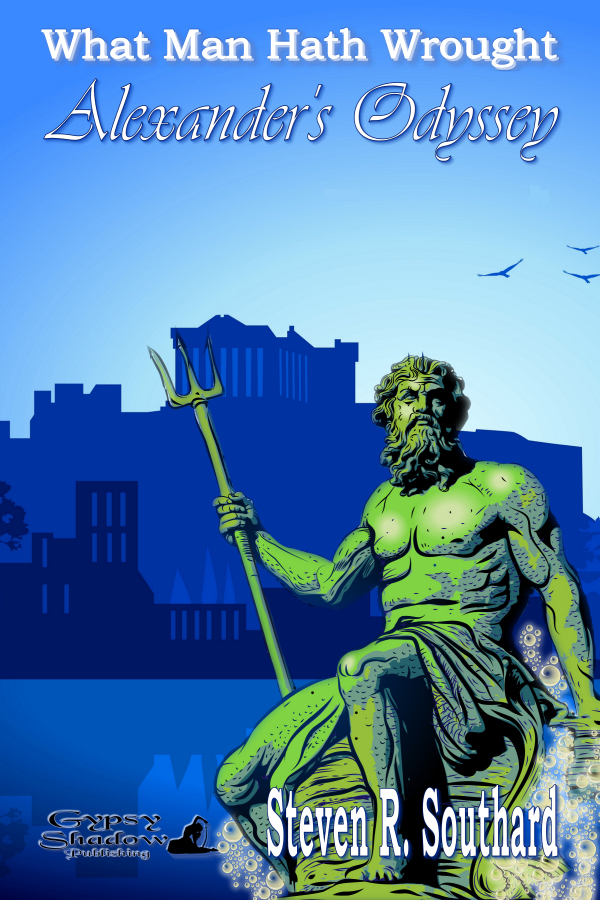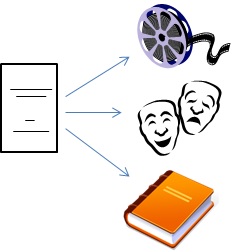 Hello. I’m a short story. Since Poseidon’s Scribe never got around to blogging about the whole short story process, he invited me to guest blog today. My title is “Alexander’s Odyssey,” and I was written by Steven R. Southard. My life story is typical of other tales, and might be obvious to many of you, but the steps weren’t clear to Steve when he started.
Hello. I’m a short story. Since Poseidon’s Scribe never got around to blogging about the whole short story process, he invited me to guest blog today. My title is “Alexander’s Odyssey,” and I was written by Steven R. Southard. My life story is typical of other tales, and might be obvious to many of you, but the steps weren’t clear to Steve when he started.
 1. Idea. I started as an idea. You did too, I suppose, but with stories you only need one human with an idea, if you know what I mean. Getting a story idea isn’t as difficult as most believe. Ideas are all around you.
1. Idea. I started as an idea. You did too, I suppose, but with stories you only need one human with an idea, if you know what I mean. Getting a story idea isn’t as difficult as most believe. Ideas are all around you.
 2. Outline. This can take many forms, not just the standard I-A-1-a-(1) type. It can be a mind-map, for example. An outline can keep you focused as you write, but don’t be afraid to deviate from it if the story takes off in a different direction. Steve used an outline for me, but if you don’t want to, just skip this step.
2. Outline. This can take many forms, not just the standard I-A-1-a-(1) type. It can be a mind-map, for example. An outline can keep you focused as you write, but don’t be afraid to deviate from it if the story takes off in a different direction. Steve used an outline for me, but if you don’t want to, just skip this step.
 3. Research. You might have to conduct research for your story like Steve did for me. Use the most authoritative sources you can. Steve didn’t include all the researched data when writing me, just a tiny fraction. You might enjoy research, but don’t get stuck at this stage. At some point, enough is enough.
3. Research. You might have to conduct research for your story like Steve did for me. Use the most authoritative sources you can. Steve didn’t include all the researched data when writing me, just a tiny fraction. You might enjoy research, but don’t get stuck at this stage. At some point, enough is enough.
 4. First Draft. Steve wrote my first draft fast, without caring about quality. He didn’t even stop to correct typos. He got it all down, the emotions, the drama, and the character interactions.
4. First Draft. Steve wrote my first draft fast, without caring about quality. He didn’t even stop to correct typos. He got it all down, the emotions, the drama, and the character interactions.
 5. Edit. Steve did several drafts of me where he corrected typos; deleted extraneous stuff; added in foreshadowing, metaphors, similes, and symbolism, etc. Don’t get stuck at this stage either; some stories never even get submitted.
5. Edit. Steve did several drafts of me where he corrected typos; deleted extraneous stuff; added in foreshadowing, metaphors, similes, and symbolism, etc. Don’t get stuck at this stage either; some stories never even get submitted.
![]() 6. Submit. Steve located a suitable market, and had to modify me a bit to conform to the submission guidelines. After much hesitation, he submitted me. These days, you writers have the option of self-publishing us stories, so you could skip this step.
6. Submit. Steve located a suitable market, and had to modify me a bit to conform to the submission guidelines. After much hesitation, he submitted me. These days, you writers have the option of self-publishing us stories, so you could skip this step.
 7. Rejection. Actually, I didn’t get rejected the first time, but I know the feeling. I don’t understand why writers take rejection so personally; the editor is rejecting me, not you. Just shake it off and submit your story to some other market. Keep us moving!
7. Rejection. Actually, I didn’t get rejected the first time, but I know the feeling. I don’t understand why writers take rejection so personally; the editor is rejecting me, not you. Just shake it off and submit your story to some other market. Keep us moving!
 8. Accept. I was pretty happy when an anthology editor accepted me, but Steve was positively giddy. I’d never seen him so thrilled and, frankly, the details are embarrassing, so I’ll just move on.
8. Accept. I was pretty happy when an anthology editor accepted me, but Steve was positively giddy. I’d never seen him so thrilled and, frankly, the details are embarrassing, so I’ll just move on.
 9. Rewrite. The editor suggested Steve change me a bit. He agreed the changes would do me good, and made them. I’ve seen Steve agonize over suggested changes to other stories, though. I’ve even seen him push back against the editor. In the end, they always reach agreement and Steve signs the contracts. I guess he could always refuse and walk away if he wanted.
9. Rewrite. The editor suggested Steve change me a bit. He agreed the changes would do me good, and made them. I’ve seen Steve agonize over suggested changes to other stories, though. I’ve even seen him push back against the editor. In the end, they always reach agreement and Steve signs the contracts. I guess he could always refuse and walk away if he wanted.
![]() 10. Launch. These days, publishers don’t just publish us, they launch us. It does make me feel like a rocket going off, sort of. Again, Steve seems really happy when a story launches, and again it’s awkward to watch.
10. Launch. These days, publishers don’t just publish us, they launch us. It does make me feel like a rocket going off, sort of. Again, Steve seems really happy when a story launches, and again it’s awkward to watch.
 11. Market. If I’d been picked up by one of the top publishing houses, they’d spread the word about me. Steve didn’t send me there, so he had to do it. Boy, does he hate that part, though I’ve heard some authors like marketing. Use social media, newsletters, writing conferences—anything to advertise.
11. Market. If I’d been picked up by one of the top publishing houses, they’d spread the word about me. Steve didn’t send me there, so he had to do it. Boy, does he hate that part, though I’ve heard some authors like marketing. Use social media, newsletters, writing conferences—anything to advertise.
 12. Read. My favorite step. When a reader buys me and reads me cover to cover, that’s what I live for.
12. Read. My favorite step. When a reader buys me and reads me cover to cover, that’s what I live for.
 13. Reprint. When the rights to me reverted back to Steve, he submitted me for publication as a reprint. After three rejects, another market accepted me, but asked for significant changes. My reprint version states where and when I was published the first time.
13. Reprint. When the rights to me reverted back to Steve, he submitted me for publication as a reprint. After three rejects, another market accepted me, but asked for significant changes. My reprint version states where and when I was published the first time.
 14. Spin-off. Oh, I hope, I hope I can get spun-off into a novel, a play, or even a movie. Hey, a story can dream, can’t it?
14. Spin-off. Oh, I hope, I hope I can get spun-off into a novel, a play, or even a movie. Hey, a story can dream, can’t it?
That’s my story. Forget about Steve, or Poseidon’s Scribe. Address your comments to—
Alexander’s Odyssey

